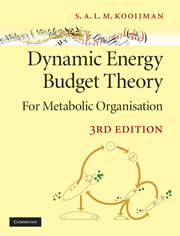Book contents
- Frontmatter
- Contents
- Preface
- 1 Basic concepts
- 2 Standard DEB model in time, length and energy
- 3 Energy, compounds and metabolism
- 4 Univariate DEB models
- 5 Multivariate DEB models
- 6 Effects of compounds on budgets
- 7 Extensions of DEB models
- 8 Covariation of parameter values
- 9 Living together
- 10 Evolution
- 11 Evaluation
- References
- Glossary
- Notation and symbols
- Taxonomic index
- Index
10 - Evolution
Published online by Cambridge University Press: 05 June 2012
- Frontmatter
- Contents
- Preface
- 1 Basic concepts
- 2 Standard DEB model in time, length and energy
- 3 Energy, compounds and metabolism
- 4 Univariate DEB models
- 5 Multivariate DEB models
- 6 Effects of compounds on budgets
- 7 Extensions of DEB models
- 8 Covariation of parameter values
- 9 Living together
- 10 Evolution
- 11 Evaluation
- References
- Glossary
- Notation and symbols
- Taxonomic index
- Index
Summary
A proper understanding of metabolic organisation cannot be achieved without exploring its historical roots. The metabolism of individuals has adapted over time to overcome the consequences of changing environmental conditions. Mutation and selection is the well-known evolutionary route since Darwin, but this is a very slow process. It is essential for building up a basic diversity in metabolic performance among the earliest prokaryotes. This explains the slow start of evolution. Much faster is the exchange of plasmids that evolved among prokaryotes, which is further accelerated by the process of symbiogenesis, typical for eukaryotes. The latter also duplicate dna and reshuffle parts of their genome, giving adaptive change even more acceleration. Mutation still continues, of course, but the reshuffling of metabolic modules occurs at rates several orders of magnitude higher. Syntrophy and symbiosis are key to these reshuffling processes and supplement Darwin's notion of survival of the fittest, which is based on competitive exclusion. The response to changes in the environment is further accelerated by the development of food webs, and therefore of predation, which enhances selection. Owing to their advanced locomotory and sensory systems, animals play an important role in food webs, and so in the acceleration of evolutionary change.
The evolutionary route for individuals as dynamic systems that is discussed below starts from the speculative abiotic origins of life, then deals with the metabolic diversification that evolved in the prokaryotes, and finally leads to the metabolic simplification, coupled to the organisational diversification, of the eukaryotes.
- Type
- Chapter
- Information
- Dynamic Energy Budget Theory for Metabolic Organisation , pp. 384 - 429Publisher: Cambridge University PressPrint publication year: 2009



